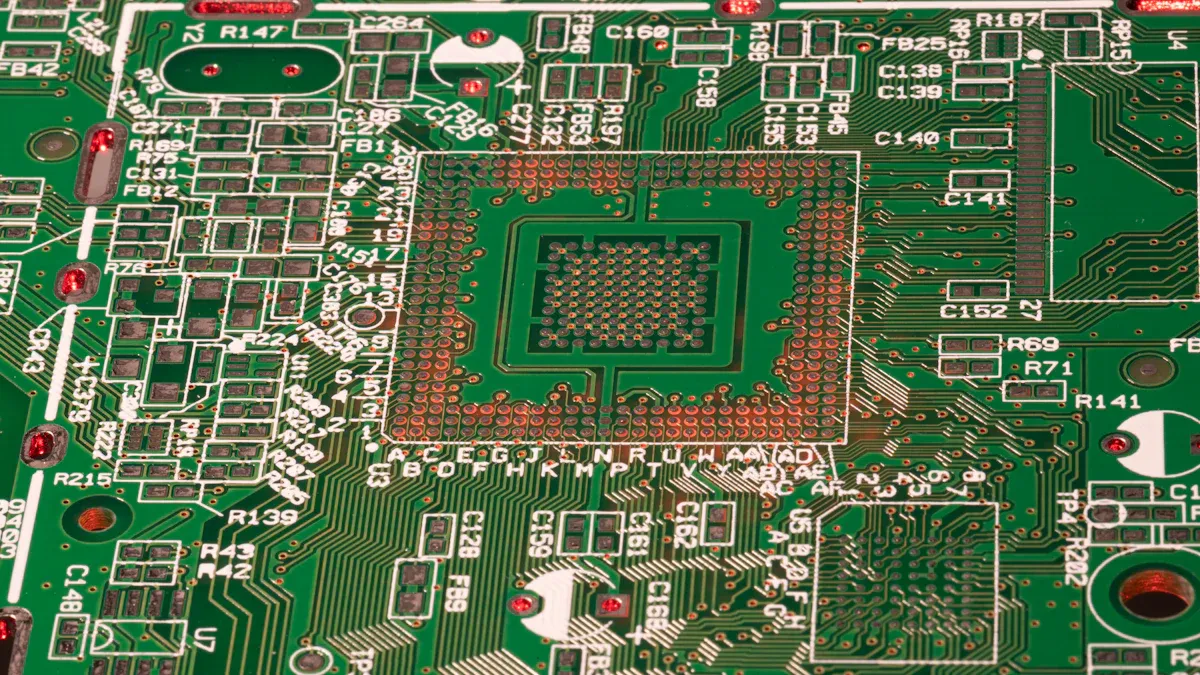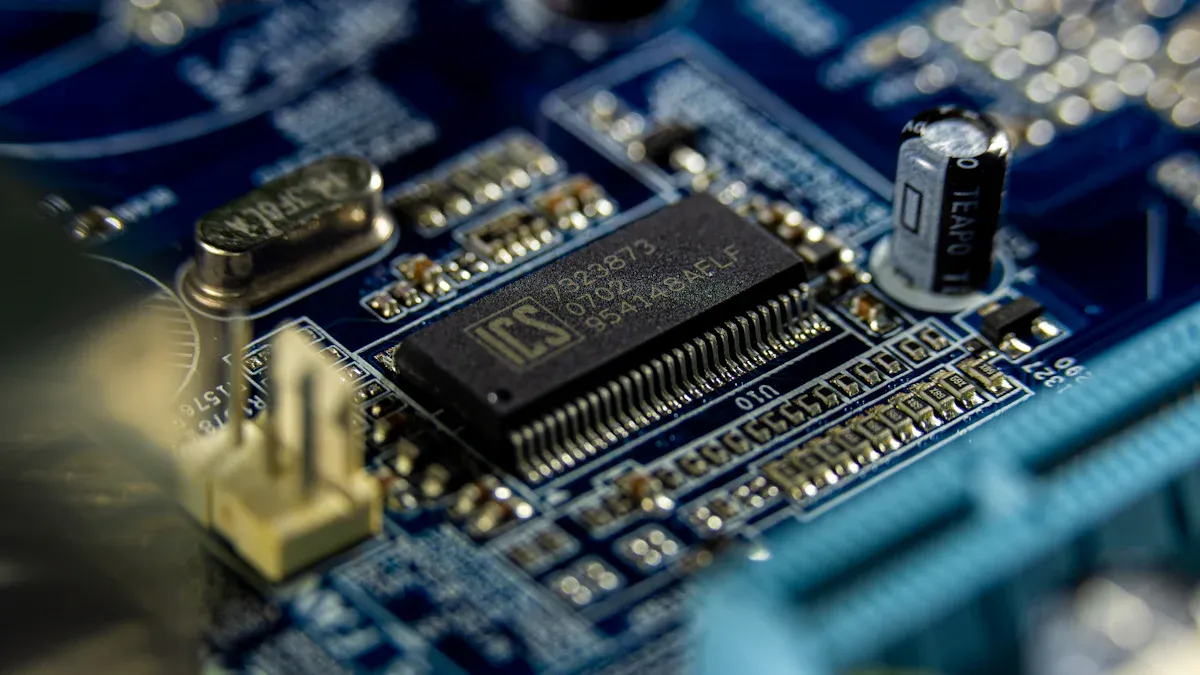
The benefits of reshoring PCBA to the USA are significant for businesses. Producing products locally reduces reliance on overseas suppliers, streamlining operations and enhancing efficiency. Reshoring allows for better control over product quality while mitigating global challenges. Additionally, it safeguards intellectual property, ensuring your ideas remain secure. These advantages of reshoring PCBA to the USA enable businesses to optimize processes, accelerate workflows, and maintain a competitive edge in a dynamic market.
Key Takeaways
Moving PCBA production back to the USA lowers unseen costs. It improves communication and makes quality checks easier.
Making products locally removes shipping costs and import taxes. This helps businesses earn more and stay ahead of competitors.
Faster delivery times and simpler inventory tracking improve supply chains. Companies can quickly adjust to market needs.
U.S. factories follow strict quality rules, creating dependable products. They also keep ideas and designs safe from theft.
Government programs like the CHIPS Act give money to help. This makes reshoring cheaper and better for companies.
Cost Benefits of Reshoring Production

Cutting Hidden Costs
Using overseas factories for electronics can bring unexpected expenses. These costs come from quality problems, communication issues, and shipping challenges. Products made offshore may have more defects due to different standards. Fixing these defects or making repairs costs money and delays shipments.
Another hidden cost is buying more than you need. Overseas suppliers often require large orders, which ties up your money. Long shipping times also mean waiting longer for products, slowing your ability to react to market changes. Time zone differences and language problems make solving issues harder, causing delays and missed chances.
Making electronics in the USA removes these hidden costs. Local factories offer better communication, quicker fixes, and higher quality. You can control production better, reducing mistakes and cutting waste.
Saving on Tariffs and Import Fees
Import taxes and fees can hurt your profits when buying from overseas. Many countries charge high taxes on imported goods, especially electronics. These extra costs make it harder to compete in the market.
Producing in the USA removes these fees. Domestic production means no import taxes or tariffs. This saves money and boosts your profits, giving your business an advantage.
Reshoring also avoids surprises from changing trade rules. You don’t have to worry about sudden tax increases or new import laws. This stability helps you plan your budget and grow your business confidently.
Lowering Shipping Costs
Shipping items from far away is costly and slow. Overseas production means paying for long-distance shipping, fuel, and customs fees. These costs add up, especially for large or heavy electronics.
Making products in the USA cuts shipping costs a lot. Local production means shorter trips, cheaper shipping, and faster deliveries. You can get products to customers quicker and save money.
Domestic production also avoids delays from global problems. Natural disasters, crowded ports, or political issues can stop international shipments. Reshoring ensures a steady supply chain, keeping your business running smoothly.
Enhancing Supply Chain Strength
Shorter Wait Times
Making electronics in the U.S. shortens wait times a lot. You don’t have to deal with long overseas shipping delays. For instance, shipping from Guadalajara to the U.S. takes just a few days. This is much faster than waiting weeks or months for international shipping.
Local factories also make communication easier. You can quickly fix problems or make changes. Work hours match up, and there are no language issues. This helps you deliver products faster and meet customer needs better.
Avoiding Global Problems
Global issues can mess up your supply chain. Things like bad weather, political troubles, or pandemics cause delays and raise costs. By making products locally, you avoid many of these problems.
More companies are choosing local suppliers to stay safe. About 66.2% of businesses now do this. Local production also lets you use flexible designs. You can use the same parts for different products, which helps you handle risks better.
Some companies now keep extra stock instead of just enough. This “just-in-case” method helps with sudden demand or supply problems. Making products in the U.S. gives you more control and less worry about global markets.
Easier Inventory Control
Producing electronics locally makes managing inventory simpler. Faster production and steady supplies mean you don’t need big storage spaces. This saves money and lowers the risk of having too much stock.
For example, Firstronic LLC grew their business by 300% after reshoring. They used smart tools to improve inventory management and doubled how often they turned over stock.
Local production helps you react quickly to demand changes. You can avoid running out of stock and keep customers happy. Better inventory control improves your business and keeps things running smoothly.
Quality and Compliance in U.S. Manufacturing
Superior Manufacturing Standards
Making products in the U.S. means following strict rules for quality. Factories here meet high standards set by groups like ISO. They also spend a lot on research to use the best tools and methods. This focus on new ideas helps make better electronics that meet top standards.
U.S. factories also care about the environment. They follow eco-friendly rules like RoHS and use lead-free materials. These steps protect nature and make products last longer. Fair treatment of workers is another plus, ensuring ethical ways of making goods.
Aspect | Description |
|---|---|
Quality Standards | U.S. factories follow strict rules set by groups like ISO. |
R&D Investment | Spending on research helps use the newest tools and methods. |
Environmental Compliance | Rules like RoHS and lead-free materials ensure eco-friendly production. |
Manufacturing Practices | Ethical work and eco-friendly steps improve product quality. |
Enhanced Product Reliability
Making electronics in the U.S. makes them more reliable. Factories here focus on reducing mistakes, improving success rates by up to 95%. Careful checks make sure every part works as it should, lowering the chance of problems.
A special test called SIR checks how well parts resist damage. Factories also use coatings to stop dirt and rust, which keeps products working longer. These steps make sure your electronics stay strong in different conditions.
Fewer mistakes mean success rates up to 95%.
Careful checks make products more reliable.
SIR tests ensure parts resist damage.
Coatings stop dirt and rust from causing problems.
Intellectual Property Protection
Making electronics in the U.S. keeps your ideas safe. Local factories don’t need you to share designs with overseas suppliers. This reduces the risk of someone stealing or misusing your ideas.
U.S. laws protect your inventions and designs very well. By making products locally, you can focus on creating new things without worrying about theft. This safety helps your business stay ahead of others.
Tip: Making products in the U.S. not only improves quality but also keeps your ideas safe, so you can create with confidence.
Overcoming Challenges in Reshoring
Addressing Labor Costs
Labor costs in the U.S. seem higher than in places like China. But wages in Asia are rising, making reshoring a better choice. In February, U.S. electronics workers earned 3.2% more than last year. This increase affects prices but can be managed. Working with manufacturers that have many U.S. factories helps reduce costs.
Businesses can save money by using smart strategies. For example, working with local PCB makers cuts shipping time to under four weeks. Using Vendor-Managed Inventory (VMI) in areas like Silicon Valley lowers storage costs by 30%. These methods help keep expenses low while keeping quality high.
Tip: Teaming up with local suppliers and upgrading factories can balance labor costs and improve your supply chain.
Tackling Workforce Shortages
Finding workers for PCBA production is tough, especially for skilled jobs. Roles like machine operators and technicians are hard to fill. Encouraging STEM learning in schools and offering training programs can bring more people into electronics jobs.
Flexible staffing is another good solution. Partnering with community colleges to teach quick courses on SMT skills can train workers in three months. This lowers labor costs by 20% and ensures a steady flow of skilled employees. AR tools also make assembly easier for new workers, reducing the need for experience.
Investing in training programs helps solve worker shortages and builds a stronger supply chain.
Leveraging Automation and Technology
Automation is making U.S. production faster and cheaper. AI-powered SMT machines, like Universal Instruments’ Advantis, place 120,000 parts per hour. This cuts labor needs by 70%. Cobots help with tasks like inserting parts and checking quality, reducing the need for skilled workers.
Digital tools like AI, RPA, and IoT make buying supplies easier and cheaper. These technologies save big companies billions each year. Adding automation to your factory boosts productivity and lowers costs.
Working with local PCB makers to upgrade production lines also helps. These upgrades speed up production and keep quality consistent. Automation and technology not only solve labor problems but also make your supply chain stronger.
Using Help from the Government
Government programs make reshoring PCBA production to the U.S. easier and cheaper. These programs offer money, tax breaks, and grants to help businesses. They lower the costs of bringing production back to the U.S. By using these programs, you can save money and buy better tools.
One big program is the CHIPS and Science Act. It gives up to $6.6 billion to support making semiconductors and electronics in the U.S. For example, TSMC Arizona Corporation used this program to build a high-tech factory in Phoenix, Arizona. The company spent over $65 billion, showing how government help can support big reshoring projects.
What It Is | Details |
|---|---|
Government Program | CHIPS and Science Act |
Funding Available | Up to $6.6 billion |
Example Company | TSMC Arizona Corporation |
Total Spending | Over $65 billion |
Factory Location | Phoenix, Arizona |
States also give tax credits and training programs for workers. These benefits help lower labor costs and teach workers new skills. Some states even offer tax breaks for buying automation machines. This can make running your factory much cheaper.
Tip: Look into state and federal programs that match your reshoring plans. These programs can save you money and help your business grow.
Using government programs makes reshoring more affordable. They cut costs, help you upgrade your factory, and improve your supply chain. Take time to explore these options and set your business up for success in U.S. manufacturing.
Bringing PCBA production back to the USA in 2025 is smart. Shorter supply chains save money and lower risks. They also make it easier to check product quality. Faster production helps you meet customer needs and release products quickly. Reshoring makes supply chains stronger and protects your business from global problems. Experts say demand for U.S.-made electronics will grow, especially for semiconductors. By solving challenges with creative ideas and using government support, reshoring can lead to long-term success. Start now to stay ahead in a fast-changing market.
FAQ
What is PCBA reshoring?
PCBA reshoring means moving printed circuit board assembly (PCBA) production back to the USA. It lowers costs, improves product quality, and makes supply chains stronger.
How does reshoring improve supply chain resilience?
Reshoring makes supply chains shorter and avoids shipping delays. It also reduces risks from global problems and helps manage inventory better. Businesses can respond faster to market needs.
Are U.S. labor costs too high for reshoring?
U.S. labor costs are higher, but automation helps reduce expenses. Government programs and working with local suppliers make reshoring more affordable.
What government programs support reshoring?
Programs like the CHIPS and Science Act offer funding and tax breaks. These programs help businesses save money and improve factories for reshoring.
Why is reshoring important for intellectual property protection?
Making products in the USA keeps your ideas safe. U.S. laws protect designs and reduce the risk of theft by overseas manufacturers.
Tip: Look into reshoring now to stay ahead and grow your business.
See Also
Enhancing Workflow Efficiency in PCBA Production Processes
Significance of PCBA Manufacturing Skills in Electronic Design
Reasons Behind China’s Dominance in PCBA Contract Production
Ten Professional Suggestions for Cost-Effective PCBA Assembly
Ensuring Quality and Efficiency in PCBA Production Techniques